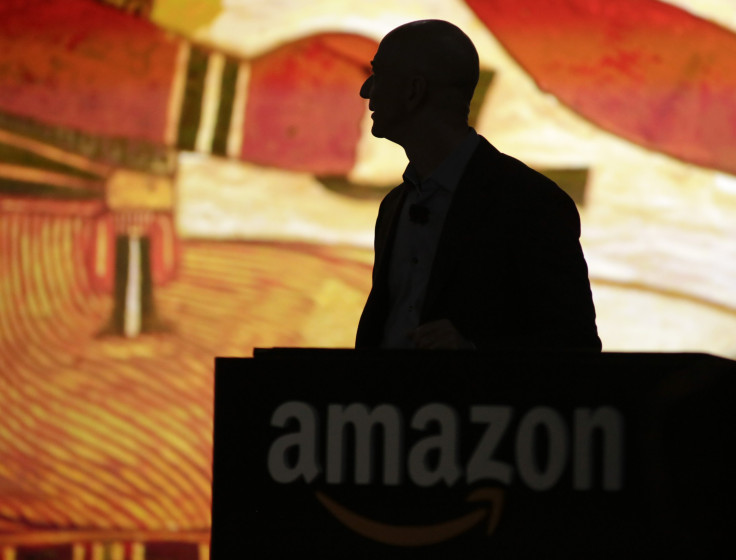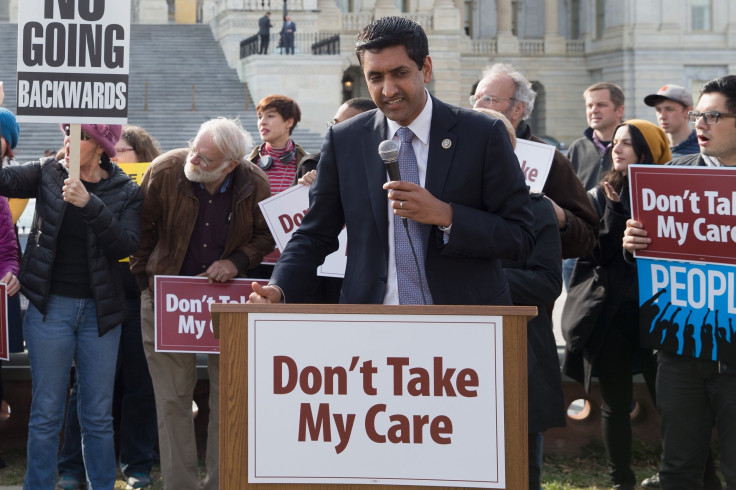Amazon-Whole Foods Merger: Silicon Valley Lawmaker Wants Regulators To Review Bezos Deal

Ro Khanna represents Silicon Valley in Congress and has raised campaign cash from Internet moguls -- but that doesn’t mean he thinks antitrust regulators should go easy on the tech industry. Instead, the freshman Democratic congressman this week became the first federal lawmaker to raise red flags about Amazon’s proposed acquisition of Whole Foods -- a deal that Khanna says requires tough scrutiny from regulators amid fears that it could hurt both consumers and workers. He also raised concerns about potential links between Donald Trump administration regulators and the companies that could be involved in the merger.
“We have an unprecedented merger of an online company trying to go into the bricks and mortar retail industry, where we already have consolidation,” Khanna told International Business Times during a podcast interview. “[Amazon is] putting pressure on supply chains and they have almost 40 percent, I think, in some reports of the online market... It's not just about taking over Whole Foods, which has a 2-3 percent share of the grocery market. It's about going into the brick and mortar retail space, which has very high initial costs. And if Amazon gets into that space, they have the ability to grow, especially because they can absorb a lot of loss and have lower prices, and to really leap to greater economic concentration, not just in the grocery industry but in the retail industry.”
Subscribers can click here to listen to the full podcast.
Khanna pointed to a 1966 Supreme Court case over a grocery merger, in which the court ruled that antitrust law was designed “to preserve competition among small businesses by halting a trend toward concentration in its incipiency.” He said that affirmed regulators’ right to scrutinize how mergers would affect not only prices, but also other economic factors like wages. But then, courts in the late 1970s adopted the narrower antitrust theories of legal scholar Robert Bork, whose 1978 book “The Antitrust Paradox” argued that antitrust regulation should only look at mergers’ effect on consumers.

“We've got to go back to the pre-Robert Bork antitrust framework and that means looking at factors, such as impact on wages, which isn't considered, impact on local communities, which isn't considered, impact on jobs,” he said, raising questions about whether Amazon will reduce workers' wages at Whole Foods, which has said it pays higher-than-market wages. “When you had Theodore Roosevelt and the Sherman Act and Justice Brandeis railing against large corporations and their power in society, it wasn't simply about consumers.”
“They No Longer Open Investigations”
By many measures, antitrust enforcement in recent years has declined.
The Reagan administration first began pushing for more relaxed antitrust scrutiny of mergers, ultimately ushering in a then-unprecedented era of consolidation. A Government Accountability Office report in 1990 found that the antitrust division “brought fewer civil suits than it did in the previous decade and opposed fewer mergers” and that according to Justice Department officials, “they no longer open investigations into some matters -- particularly mergers.”
More recently, Law360 reported that last year “saw a considerable drop in fines collected by the Antitrust Division from companies and individuals,” and that Justice Department data “show some of the lowest numbers in total criminal fines and penalties in the last 10 years.”
At the same time antitrust enforcement has declined, there are signs many sectors of the American economy have become more consolidated. In 2016, for instance, The Economist reported that in reviewing 900 different economic sectors, “two-thirds of them became more concentrated between 1997 and 2012”; the “average share of the top four firms in each sector has risen from 26 percent to 32 percent.” Similarly, a study by researchers at Rice University, York University and Cornell University found that “market concentration has systematically increased in over 75 percent of U.S. industries over the last forty years.”
This has meant workers increasingly toiling at huge corporations who critics say have the market and employment power to hold down wages. Since 1980, the share of service workers at companies with more than 10,000 employees has doubled.
In the 1990s, language endorsing strong antitrust enforcement was removed from the Democratic Party’s platform, according to New America’s Matt Stoller. However, in 2016, as the Obama administration’s Justice Department sought to block to health insurance mergers, Democrats re-inserted language into their party platform endorsing “steps to stop corporate concentration in any industry where it is unfairly limiting competition.” The platform promised to “make competition policy and antitrust stronger and more responsive to our economy today.”
“Progressives need to invest in the institutions and think tanks to help reclaim the real antitrust tradition and go back to the Sherman Act...and really reclaim the purpose of antitrust, which was to stand up for workers and to stand against concentration,” Khanna said.
“The Tech Industry Is One Of The Nation's Most Vibrant”
That Democratic Party platform language, though, left out a proposed line promising to scrutinize “the market power amassed through data and network consolidation by digital gatekeepers,” according to Bloomberg News. The omission came as Democrats were benefiting from big infusions of campaign cash from tech industry giants such as Amazon, Apple and Microsoft.
That money has flowed to the party as the industry continued to lobby on antitrust policy in the last year. Since 2016, Google, AT&T, Qualcomm, Spotify, Comcast, Microsoft, Charter Communications, Airbnb, Oracle, Pandora, Sprint, Verizon and T-Mobile have all lobbied on antitrust issues, according to federal documents reviewed by IBT.
One line of argument says that even as internet giants like Google and Microsoft dominate huge swaths of the online economy, antitrust regulators should refrain from intervening.
“The tech industry is one of the nation's most vibrant, subject to constant competition and disruption—precisely the opposite of the market characteristics antitrust law was meant to stop,” wrote CNBC’s Matt Rossoff. “This isn't a case of five companies sitting comfortably on their piles of gold and colluding to stay out of each other's core areas. It's all-out war, year after year... Antitrust law is a blunt instrument meant to be used in cases of obvious market dominance that's clearly hurting consumers. That's not at all what the tech industry looks like today.”
Khanna, by contrast, said that tougher antitrust enforcement is needed -- and that the tech industry in his own district should not be exempt.
“What makes Silicon Valley is that it's for a culture of entrepreneurship. It's for a culture of startups,” he said. “You want to succeed because you're innovating and you're creating things in the future, not because people feel that the rules have been rigged in favor of the particular industry. And so my view is that there ought to be that enforcement, regardless of industry. There shouldn't be a carve-out for the airline industry. There shouldn't be a carve-out for the internet service providers. There shouldn't be a carve-out for tech. If there are arguments, a particular merger or a particular market share is helping both consumers and workers, then we shouldn't reflexively strike down a deal or reflexively call for breaking up the companies. But there should be the standard test and scrutiny so people have faith in the process and don't think that any particular industry is getting special consideration.”
The Intercept recently reported that some Trump administration appointees involved in federal antitrust policy come from firms linked to companies that could be involved in the Amazon-Whole Foods merger. Khanna told IBT he is uneasy about how such connections might shape the federal government’s decisions about the proposed merger.
“I am concerned about the appointments,” he said. “It seems to me this type of revolving door has been a problem in our democracy. And it's not, frankly, particular to this administration. The concern that a lot of Americans have is that the regulators of industry often come from industry. And it's not that people are saying that they are corrupt, it's that, obviously, their worldview is shaped by the industries they worked in. And so they may not have the objectivity. And I believe if people who the president has appointed really have ties to the companies which they're reviewing, they ought to recuse themselves.”
© Copyright IBTimes 2025. All rights reserved.






















